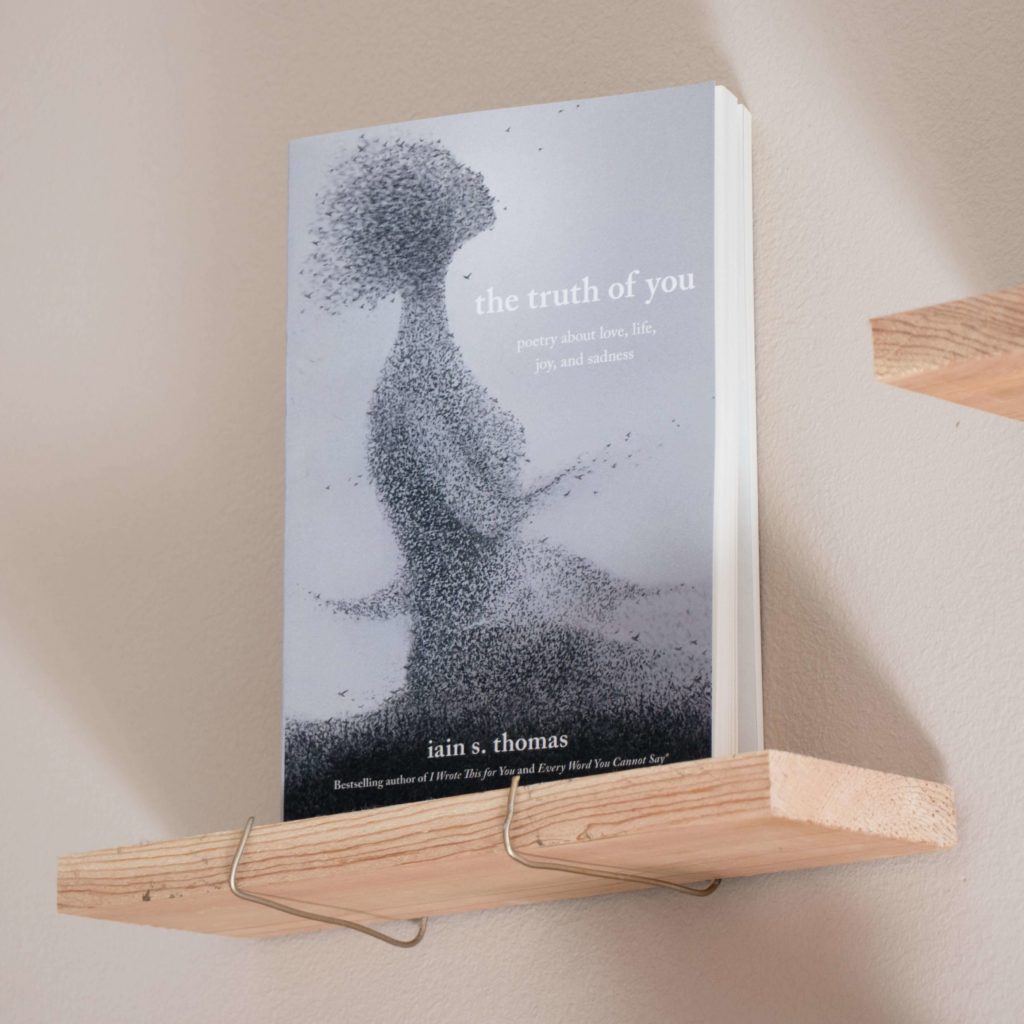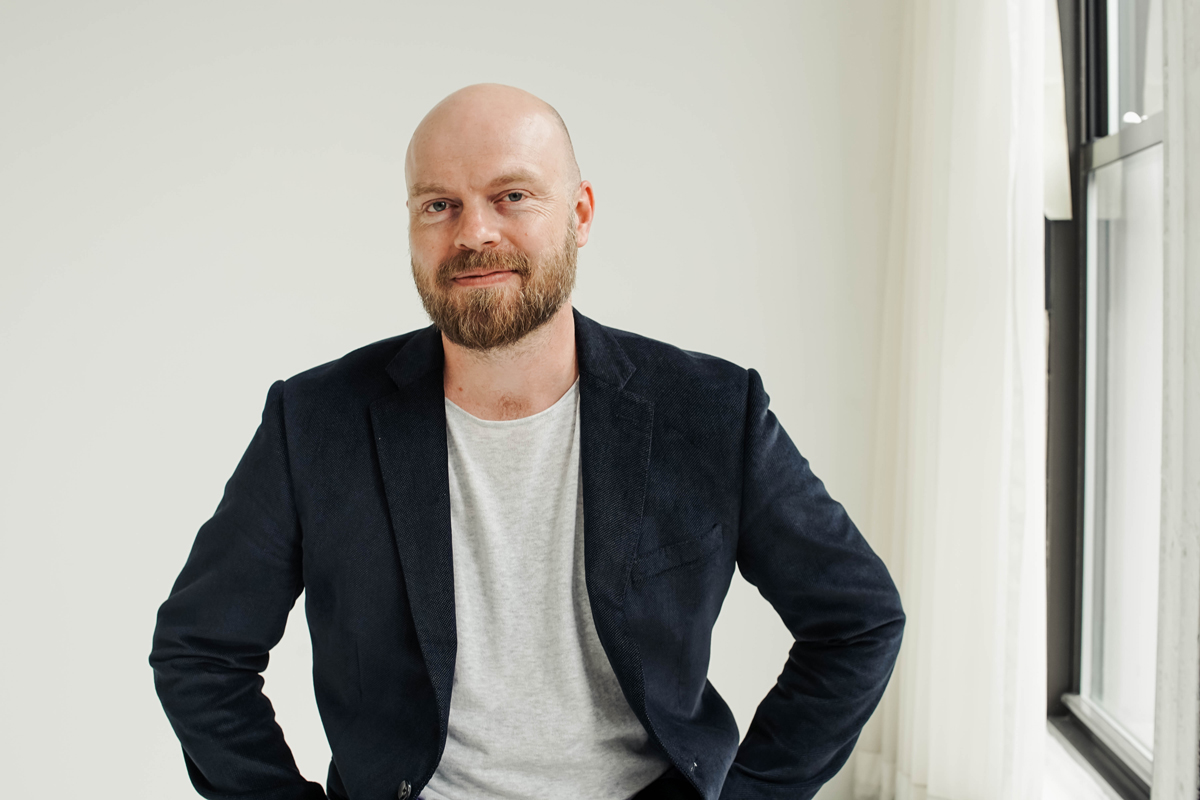The Purpose of Poetry with Iain Thomas
Poet and new media artist Iain Thomas became a worldwide phenomenon with his 2011 collection I Wrote This For You. We sat down with the bestselling author to talk about the purpose behind his work, his process, and the meaning of success. His newest collection, The Truth of You is available now.
Read Poetry: What do you feel is the purpose of your poetry?
Iain Thomas: To name the things that we all experience but we don’t give names to. What is the name of putting your hand out the window of your parent’s car when you are a child, to feel the air between your fingers? What is the name of loving someone forever and hating them completely in a moment? What is the name of carrying on when you did not think you would be able to carry on? I think poetry is a way to give names and words to things that we do not speak about in polite conversation. It gives us a way, in the quiet of our minds, between us and the book in front of us, to hear those names and say, “I know you.” My answer will change the next time you ask me but that is my answer right now.
RP: In what ways does poetry give you purpose?
IT: It makes me and the person reading it feel less alone in the world. Once I have put what I have felt down on the page and it has left my body, I share it with the world as a way to say, “I have felt this—have you felt this?” And when someone says, “Yes! I have felt that!” then we are both less alone. I want the world to be a less lonely place and to be a place where we feel more connected.
RP: Your latest collection, The Truth of You, was just released. What inspired you to write this new collection? And what lessons did you learn in the making?
IT: All writing is this kind of cycle of collecting and then releasing, and I’d been collecting these different pieces for a long time and wanted to give them a home, and that became The Truth of You. If I learned anything it was to be simple. I am always tempted to be smart, to be clever, and to try and include complications in what I do—my last book, Every Word You Cannot Say* is effectively one long poem, filled with concrete poems that play with form and ideas, and I use different colors to indicate different characters within the text. I have another indie collection of poetry called 25 Love Poems for The NSA that’s a collection of words the NSA tracks over email communication, and this time around I asked myself, “What would the opposite of that be? What is something that is just what it is?” And so between my editor, Allison, and I, we stripped away anything that wasn’t the heart and the soul of each piece.

RP: How was the journey of writing The Truth of You different from (or similar to) your previous collections?
IT: The editing of the book happened during the pandemic, while my mother was in the final stages of her battle with terminal cancer—and so as I knew she was dying, and that I would be destroyed by her passing, I threw myself into the process of finishing the book because I knew that after she passed, it would take me a long time to be able to come back to the book. And so she’s in the book in all these different ways, and she’s especially present in the prose and poems about being a parent and what that means. I don’t think it was clear to me how a parent sees a child until I became a parent, and I didn’t get long to experience that clarity with her—my kids are two and four years old. So a lot of the poems about children, and where it might seem that I’m writing about my experience of being a parent, I’m actually writing about my experience of being a child with new eyes.
RP: Did you have a theme in mind before you began, or did the meaning emerge as you worked?
IT: It became clear what it wanted to be as I was putting it together. It’s a survival book. Each of the four parts is there to give you the tools and the language you need to face life, love, loss, and death, and to act as a reminder of who you are through each of those stages of life—the truth of who you are.
RP: Did publishing your first book change your process for writing? If so, how?
IT: Yes, writing becomes harder when you know you have an audience because you’re constantly drawn into asking yourself what the audience is looking for, what they want, instead of being quiet and listening to the voice in the quiet, at the back of your head. That’s the voice your readership is there for and why they found you in the first place. You have to have faith and patience and listen.
RP: What does literary success look like to you?
IT: Being able to feed my children and send them to school. Someone discovering something I’ve written that captures something they went through. A social worker at a reading who tells me that she shares my work with the people she works with.
RP: What is one thing you hope readers take away from your latest book?
IT: The are moments of truth and beauty left in the world that stun us and leave us gasping at the infinite spirit and fire inherent in all things, but we get distracted by to-do lists and taxes and that one thing we haven’t done yet that we keep forgetting to do but it really stresses us out. I hope there is something in this book that takes you back to that fire and spirit, and that it makes everything else feel really small, even if it’s just for a little while.
RP: Can you share one writing prompt for fellow writers of poetry?
First, give yourself permission to write something beautiful. Leave the story that you can’t write or that you don’t have permission or the right to write something beautiful outside. Close your eyes and imagine yourself crumpling up that idea and throwing it as far away from yourself as possible. Understand that there are people out in the world waiting for you to name something that only you can name and that what you’re doing here is important. Then pick up your pen.
Write down how you’re feeling today. Start a second sentence with the word “and,” and then another, and another after that sentence. See how far you can get and how many sentences that start with “and” you can write after that one. As soon as you start to elaborate on what you’re going through, you’ll discover something personal and true and universal, and from there, all you have to do is make it sing.




